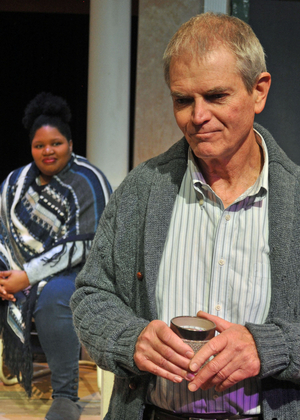Review: PROOF at Metropolitan Ensemble Theatre

and Kevin Fewell as Robert
in David Auburn's PROOF
PROOF is an interesting, four person, theatrical enterprise that explores the nexus between genius and profound mental illness. This 2001 Pulitzer Prize winner by David Auburn is currently completing its extended run at Metropolitan Ensemble Theatre's Warwick Theatre in midtown this Saturday February 25.
PROOF is a term from the world of high level theoretical mathematics. It is a mathematical expression that describes a new conceptual idea. PROOF opens at the south Chicago home of Catherine (Brandis Outlaw) and her father Robert (Kevin Fewell), a full professor of Mathematics at the University of Chicago.
It is Catherine's twenty-fifth birthday. She is clinically depressed and drinking a bottle of inexpensive sparkling wine by herself. We soon discover that the Robert we see talking with Catherine is an illusion. He has died of heart failure last week after a long battle with mental illness. Hal (Tommy Waller), one of Robert's acolytes, is inside Robert's study. Hal pours through more than a hundred notebooks hoping against hope that he will discover a final flash of brilliance glowing from Robert's failing brain.
As a young man, Robert was brilliant and made significant contributions to several disciplines before sinking into a prolonged decline. Catherine has been a super-promising undergraduate at neighboring Northwestern University before realizing that Robert needed a full time caretaker. Catherine fears that she has inherited the genetic tendencies that contributed to Robert's illness. She shares her father's exceptional facility with Math.
%20(2).jpg)
Catherine has devoted the past six years of her young life to her father's care alone. An older sister, Claire, has fled to New York. Claire has provided financial resources, but has otherwise stranded Catherine on her own. An intense bitterness has grown up between the sisters.
Hal asks Catherine if he can take the dozens of notebooks with him to work. She resists. Catherine does not trust anyone. An ugly scene develops. Catherine threatens to call the police. Hal agrees to return to the home to through Robert's papers, but within Catherine's control.
Catherine awaits the arrival of Claire (Donette Coleman) from New York for George's scheduled funeral tomorrow. Claire arrives alone. Her fiancé, Mitch, has not come with her. The bitterness flares. Claire invites to return with her to New York and take up residence there. Another fight looms.
Claire holds a wake for Robert at the home following the funeral. We hear the sounds of a gathering. Hal and Catherine are alone on the porch. Although he is only in his late twenties, Hal confesses to her that he is fearful that his best time as a theoretical mathematician may have already passed. They reconcile and eventually kiss. They have a private tryst.
Hal joins Catherine again on the patio the following morning. Her mood is improved. She takes a key from around her neck and suggests Hal look at a notebook in a locked drawer.
Claire appears, hung over from the night before. She seems ready to make amends. makes the fatal error of pushing Catherine to move to New York immediately. She reveals that she has both decided and made a deal to sell the family home. fears that Catherine will follow their father into madness. Catherine is also afraid, but she is more offended that her sister has not bothered to consult her. Hal reappears. He has found the profound new work inside the locked drawer. Hal believes this new PROOF to have been Robert's. reveals it is hers. They doubt Catherine.
.jpg)
Act II begins with another flashback. It is exactly six years ago on Catherine's birthday. Catherine announces she will attend Northwestern. Robert questions her. There has been a temporary remission of Robert's decline. A younger Hal drops by to leave a draft of his doctoral dissertation. It becomes clear after conversation that Robert cannot be left to fend for himself. Catherine drops the idea of returning to college.
Flashing forward to the end of Act I, a stem-winder of a row has erupted. Catherine hopes Hal will back her up, but he cannot grasp that this much brilliance and complexity could have come from the mind of a college undergrad. Hal attempts to apologize, but Catherine has withdrawn into a deep depression. Claire shares Catherine's PROOF notebook with to Hal for study.
Catherine flashes back one last time to one of her father's good periods. He seems energized, but the work in which he is so absorbed turns out to gibberish. She promises to watch out for him. She is trapped.
Back in the present, Claire and Catherine endure one final confrontation. Claire wants to do the right thing, but is probably secretly relieved she can leave her past behind. Claire storms off. Hal reenters to beg forgiveness. His examination of the PROOF tells him that the techniques used could not have been Robert's. There is reproachment and a hope that madness is not necessarily genetic.
PROOF is not easy stuff. It is deep and dark. The cast does a good job. PROOF is a strong choice for Director Karen Paisley. While uneven at times, PROOF is that a long dark play ends long before I expect. The final two performances of PROOF are worth your time.
Photos courtesy of Metropolitan Ensemble Theatre and Bob Paisley..
Reader Reviews

Videos

